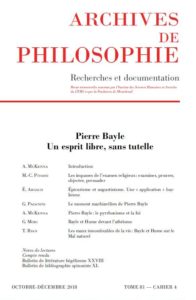 Volume 81, Issue 4, October-December 2018
Volume 81, Issue 4, October-December 2018
Pierre Bayle: The Paths of Dialog

Antony McKenna, A Foreword
Maria-Cristina Pitassi, The Deadlocks of Religious Examination: Examining, Proving, Objecting, and Persuading
The question of the legitimacy and feasibility of religious examination – one of the principal subjects of sectarian controversy in France in the seventeeth century – runs through the whole of the Baylean corpus. Closely linked to crucial questions such as the nature of divine truths, ethical dispositions of the believer, and the status of the Bible, religious examination is in reality for Bayle an oxymoron, which implies reconciliation between two antithetical psychological phenomena, namely philosophical examination and faith
Élodie Argaud, Epicureanism and Augustinism in Pierre Bayle’s Thought. A Paradoxical Affinity
We find in Bayle’s works some critical judgements based on surprising comparisons. He interprets texts by connecting them with other relevant contexts in order to emphasize the meaning – a strategy he calls « faire de belles applications ». We focus on the paradoxical affinity, picked out by Bayle, between Epicureanism and Augustinism through a comparison between Bayle and La Mothe Le Vayer on the subject of atheism
Gianni Paganini, Pierre Bayle’s Machiavellian Moment
Reading the “Florentine” entries of the Historical and Critical Dictionary, the author tries to explain how Bayle commented on Machiavelli’s Prince and Discourses regarding some crucial topics: the relationship between religion and politics, but also the subjects of republics and democracy, the relationship between morals and society, the character of the prophet, either “armed” or “unarmed.” With his usual anti-conformism, Bayle contrasted both the libertine readings (Naudé was one of his main sources) and the Huguenot condemnation, represented by Innocent Gentillet. Behind the historical figure of Savonarola, the contemporary prophet of Bayle, Pierre Jurieu, stands out
Antony McKenna, Pierre Bayle: Pyrrhonism and Faith
This article goes against the traditional interpretation of Bayle as a Pyrrhonian or Academic sceptic and insists on the radical change in his position on the relation between reason and faith. Bayle insists in his first works on the necessary agreement between reason and faith in the field of ethics. After the “Glorious Revolution”, he rejects any possible agreement between reason and faith – including the crucial field of moral truths: in other words, in order to believe Christian doctrine, one would have to be a Pyrrhonian sceptic. The argument is conducted in the framework of a temporary concession (dato non concesso), useful in his defence against Jurieu’s
Gianluca Mori, Bayle and Hume on Atheism
The strategies of Bayle and Hume on the issue of atheism are much more similar than is generally believed. This agreement stems from Bayle’s constant influence on Hume’s works. For Bayle and Hume atheism and skepticism are very closely related, insofar as the first is simply a form of the second. The strength of Hume’s Dialogues emerges precisely from this alliance between atheism and skepticism which, drawing most of its arguments from Bayle, leads to a critique of theological dogmas based on a ruthless analysis of the epistemological foundations of belief, but, as in Bayle’s Strato, avoids reducing atheism to a metaphysical dogmatism
Todd Ryan, The Innumerable Ills of Life: Bayle and Hume on Natural Evil
In Part X of the Dialogues concerning Natural Religion, Philo, the skeptic, joins forces with Demea, the defender of orthodox Christianity, to paint a harrowing picture of the wickedness and misery of human life. In this article I show that Hume’s source for many of the arguments of this section is a three-cornered debate between Bayle, Leibniz, and William King concerning the predominance of natural evil in human life. Moreover, I argue that Philo purposefully and maliciously exaggerates the misery of life to underscore the similarity between the orthodox Christian position and that of religious skeptics such as Bayle.
